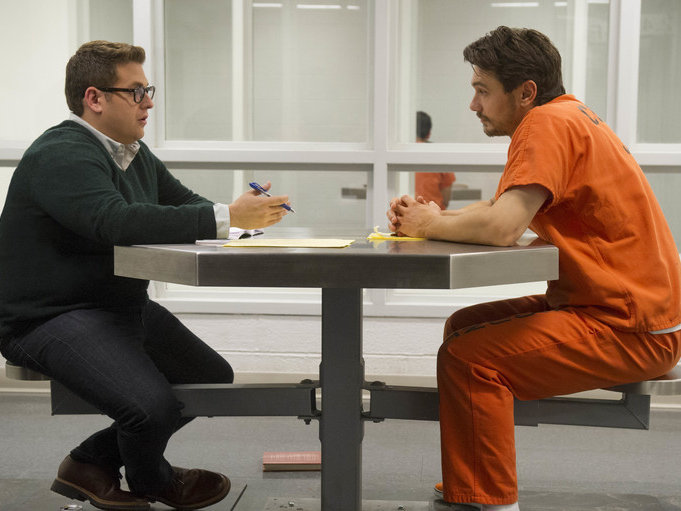An exclusive interview. A lengthy handwritten manuscript chronicling a happy life gone awry. A collection of pencil sketches summoned from deep inside a guilt-stricken, broken mind.
In the true crime drama "True Story," Christian Longo – imprisoned and accused of murdering his wife and three children – gifts this trail of breadcrumbs to reporter Michael Finkel, hinting at a deeper story deserving to be told. By the time his trial nears its verdict, however, Longo’s meandering puzzle of clues and stories add up to nothing – a long gaze into an abyss with nothing to report back other than, yep, that's an abyss all right.
Adapted from Finkel’s 2005 memoir of the same name, "True Story" unfortunately plays much the same way: an intriguingly well-paved road to nowhere. The movie certainly presents plenty of interesting pieces: two actors – Jonah Hill and James Franco – playing against type but perfectly cast, a post-Oscar nomination Felicity Jones and a bizarre real story that mixes journalism and true crime (a combination that, considering my DVR full of "Forensic Files" episodes and my love for "Zodiac," "Shattered Glass" and "All the President’s Men," usually ends in an affectionately drooling critical tongue bath from yours truly).
All of those strong components are present and accounted for in "True Story." Scene by scene, it’s fairly engaging. When it comes time to add everything together, first-time feature director Rupert Goold’s final sum equals a film as nondescript and disposable as its title.
If you’re going to call your movie "True Story," it better be one heck of a true story. Luckily, for the new true crime drama, it is – at least on paper. In 2001, right around the time the Jayson Blair plagiarism controversy was busy smearing journalistic acne all over The Grey Lady’s face, the New York Times was already in the midst of quietly cleaning up a different ethical zit: reporter Michael Finkel (Hill), fired for creating composite characters in a piece on African slave labor.
Disgraced and hopelessly pestering his connections for a job, Finkel’s next gig ends up finding him: Longo (Franco), an Oregon man accused of strangling and drowning his family, is arrested in Cancun – at the time posing as ... The New York Times reporter named Michael Finkel. Interest suitably piqued, the real Finkel visits Longo in prison and, through a blinding haze of flattered ego and desperate ambition, quickly bonds with the soft-spoken and complimentary killer. He even begins to see Longo not only as the exclusive story that could instantly resurrect his reputation, but as a kind of lost brother, another otherwise decent man who made a massive, now life-defining mistake.
His sympathy, however, doesn’t exactly endear him to the local authorities – nor to his increasingly distant girlfriend (Jones) – and by the time they reach trial, it becomes distressingly clear that he’s been playing accidental speech coach to a killer.
It’s certainly an oddball of a crime story, a healthy dash of Truman Capote’s classic "In Cold Blood" with a pinch of "Shattered Glass" and "The Boy Who Cried Wolf." There’s even a hint of something almost otherworldly going on when Finkel notices weird similarities between he and Longo’s notes and doodles.
That Hill and Franco are putting on their Very Serious Actor faces to play dramatic sparring partners only adds to the movie’s watchably weird factor. Even though the duo is outside their usual comedic tandem territory (there are certainly fewer jokes about buttholes here than in "The Interview," James Franco’s previous movie about an unsettling brotherhood forged between a journalist and a killer), the casting is on point – especially with Franco. There’s always been something transparent and fake about the actor on screen.
Usually it’s a distraction, but here, that artifice makes his character’s interactions seem especially shifty and uneasy. It always feels like the act is on, that nothing is to be trusted. And while he disappears a little underneath his Very Serious Actor guise, Hill's still good as a man blindly drunk on his story, hoping that by showing Longo is more than his gravest mistake, he’ll prove the same of himself.
There’s enough eerie stuff inherently going on in the case – and interesting stuff going on with the performances – to keep the audience invested. When it comes time for Goold and his co-writer David Kajganich to actually make something of these elements, however, "True Story" feels distinctly empty.
As bizarre as the circumstances of the Longo case are, Goold and Kajganich’s script doesn’t particularly find much in it. There’s never much of a question of Longo’s guilt – the casting of Franco and the ominous camerawork used to for his scenes make it clear he’s not to be trusted – nor of anyone else finding him innocent, so the movie is simply an investigation into the inevitable.
Instead of diving into the relationship between the two broken men or finding something larger learned from the case, "True Story" fills the space with what amounts to moody filler. There are plenty of happy fuzzy home video flashbacks and spooky clues that aren’t actually clues and ominous cut-aways to Franco looking shadowy or fidgeting in his cuffs. They’re all sufficiently chilly, but they’re also utterly vacant scenes, building to nothing.
The talented Felicity Jones gets the worst of it as Finkel’s girlfriend (supposedly; the two so desperately lack chemistry together that I spent most of the first half convinced they were siblings). She’s stuck utterly disconnected from the story save for nervously gazing upon her significant other’s investigation from a distance and getting the occasional unwanted phone call from Christian (more a nuisance than a threat).
The movie finally gives her something to do near the end, delivering an impressive speech reminding Longo that some mistakes are impossible to overlook. It’s an effective and powerful moment, but her character is such a non-factor to the story that you’re left wondering what’s the point.
It won’t be the last time that question comes up either. For 100 minutes, Goold and company compellingly recall a story that might as well end with the statement, "Well, I guess you had to be there." It is a true story, but in this case, being true just isn't enough.
As much as it is a gigantic cliché to say that one has always had a passion for film, Matt Mueller has always had a passion for film. Whether it was bringing in the latest movie reviews for his first grade show-and-tell or writing film reviews for the St. Norbert College Times as a high school student, Matt is way too obsessed with movies for his own good.
When he's not writing about the latest blockbuster or talking much too glowingly about "Piranha 3D," Matt can probably be found watching literally any sport (minus cricket) or working at - get this - a local movie theater. Or watching a movie. Yeah, he's probably watching a movie.







